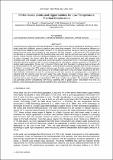| dc.contributor.author | Nayar, Kishor Govind | |
| dc.contributor.author | Swaminathan, Jaichander | |
| dc.contributor.author | Warsinger, David Elan Martin | |
| dc.contributor.author | Lienhard, John H. | |
| dc.date.accessioned | 2017-02-22T15:41:02Z | |
| dc.date.available | 2017-02-22T15:41:02Z | |
| dc.date.issued | 2015-03 | |
| dc.identifier.uri | http://hdl.handle.net/1721.1/107016 | |
| dc.description.abstract | Conventional low temperature thermal desalination (LTTD) uses ocean thermal temperature gradients to drive a single stage flash distillation process to produce pure water from seawater. While the temperature difference in the ocean drives distillation and provides cooling in LTTD, external electrical energy is required to pump the water streams from the ocean and to maintain a near vacuum in the flash chamber. In this work, an LTTD process from the literature is compared against, the thermodynamic least work and the minimum least work possible for the system, reverse osmosis (RO) and membrane distillation (MD), an alternative thermal desalination technology. In all cases compared, the product water flow rates, feed seawater inlet temperatures and cold seawater inlet conditions were held constant. Exergy and Second law analysis showed that for the LTTD system studied, under reversible operating conditions with no heat exchange with the atmosphere, a power production of 26 kWh/m3 of product water was possible. At near zero recoveries (infinite warm feed flow rates) or allowing heat exchange with an infinite ambient at the warm water temperature, maximum power production possible was found to increase to 75 kWh/m3. In contrast, the LTTD system in literature was found to consume 22 kWh/m3 while standard seawater RO consumes 2.3 kWh/m3. MD was found to be an effective alternative LTTD technology. Switching to MD from flash distillation eliminates the need for vacuum pumps and also reduces the pumping power consumption by reducing both the required cool and warm water flow rates through increased recovery ratios. Furthermore, pressure drops in the condenser on the cool side and the requirement of pumping brine back to atmospheric pressure from a near vacuum in a conventional LTTD flash chamber are avoided. The proposed LTMD system can potentially perform competitively with RO by operating with a specific power consumption less than 2.5 kWh/m3, while retaining the environmental benefits of the conventional LTTD system. | en_US |
| dc.description.sponsorship | King Fahd University of Petroleum and Minerals (KFUPM (Project No. R13-CW-10)) | en_US |
| dc.description.sponsorship | MIT & Masdar Institute Cooperative Program (Reference No. 02/MI/MI/CP/11/07633/GEN/G/00) | en_US |
| dc.language.iso | en_US | |
| dc.publisher | India Water Week | en_US |
| dc.relation.isversionof | http://www.indiawaterweek.in/download_2015.aspx | en_US |
| dc.rights | Creative Commons Attribution-Noncommercial-Share Alike | en_US |
| dc.rights.uri | http://creativecommons.org/licenses/by-nc-sa/4.0/ | en_US |
| dc.source | Prof. Lienhard via Angie Locknar | en_US |
| dc.title | Performance Limits and Opportunities for Low Temperature Thermal Desalination | en_US |
| dc.type | Article | en_US |
| dc.identifier.citation | K. G. Nayar, J. Swaminathan, D. M. Warsinger, and J. H. Lienhard V, “Performance Limits and Opportunities for low temperature thermal desalination,” in Proceedings of the 2015 Indian Water Week, New Delhi, India, Jan. 2015. | en_US |
| dc.contributor.department | Massachusetts Institute of Technology. Department of Mechanical Engineering | en_US |
| dc.contributor.mitauthor | Nayar, Kishor Govind | |
| dc.contributor.mitauthor | Swaminathan, Jaichander | |
| dc.contributor.mitauthor | Warsinger, David Elan Martin | |
| dc.contributor.mitauthor | Lienhard, John H. | |
| dc.relation.journal | Proceedings of the 2015 Indian Water Week | en_US |
| dc.eprint.version | Author's final manuscript | en_US |
| dc.type.uri | http://purl.org/eprint/type/ConferencePaper | en_US |
| eprint.status | http://purl.org/eprint/status/NonPeerReviewed | en_US |
| dspace.orderedauthors | Nayar, K.G.; Swaminathan, J.; Warsinger, D.M.; Lienhard V, J.H. | en_US |
| dspace.embargo.terms | N | en_US |
| dc.identifier.orcid | https://orcid.org/0000-0002-0988-1057 | |
| dc.identifier.orcid | https://orcid.org/0000-0001-8375-2694 | |
| dc.identifier.orcid | https://orcid.org/0000-0003-3446-1473 | |
| dc.identifier.orcid | https://orcid.org/0000-0002-2901-0638 | |
| dspace.mitauthor.error | true | |
| mit.license | OPEN_ACCESS_POLICY | en_US |
| mit.metadata.status | Complete | |
